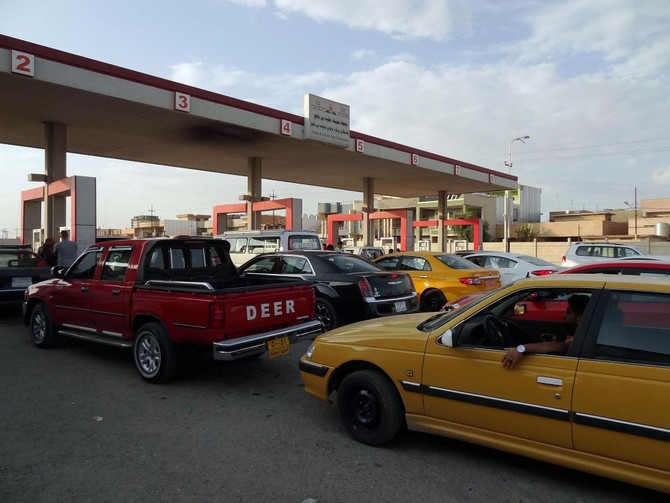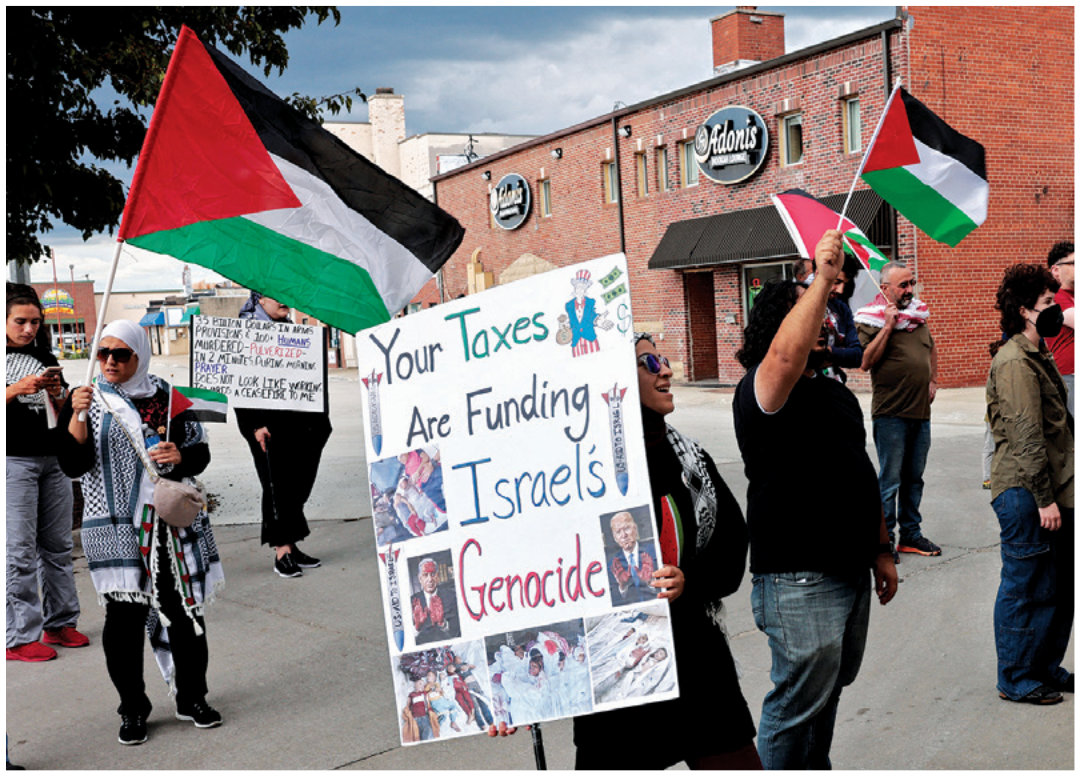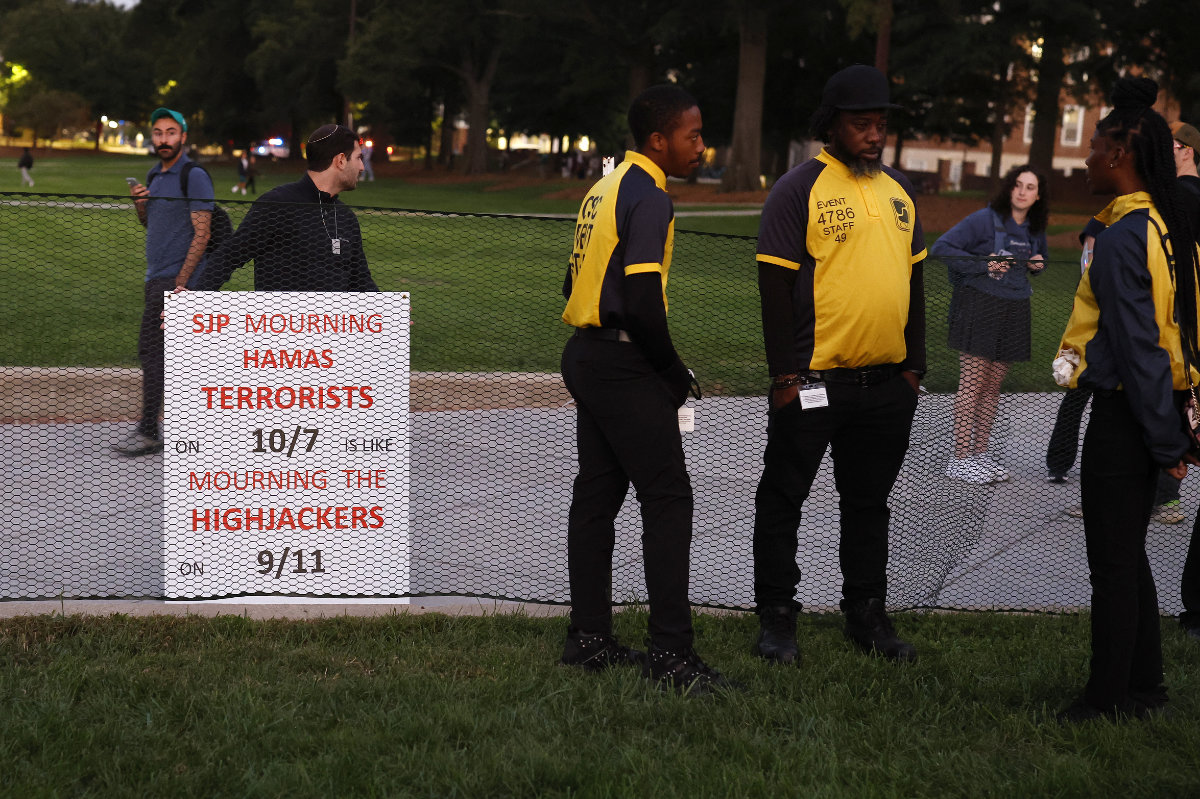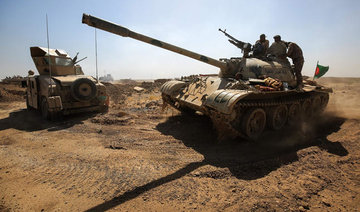BAGHDAD: Iraqi federal forces deployed near Kirkuk plan to restore the central government’s control of the northern city’s oil fields, federal officials and military sources told Arab News on Friday.
They have no intention of fighting Kurdish Peshmerga forces if they withdraw without resistance, the sources said. The military build-up on both sides in the ethnically mixed city and adjacent areas is at a peak since the federal government announced its intention to regain control of the region’s oil fields after Kurdistan held a controversial referendum on independence last month.
Kurdish authorities have sent thousands of additional troops to Kirkuk in order to “confront the threats” from Baghdad, as several units of the Iraqi Urgent Response Forces moved Friday morning toward the main road linking Kirkuk to Tikrit.
Units from the Iraqi Counter-Terrorism Squad moved toward the town of Tazza, 10 km south of Kirkuk.
The 9th Armored Division of the Iraqi Army has entered Tazza and remains there “in preparation for any further orders,” military sources told Arab News.
Hadi Al-Amiri, head of the Badr Organization, one of the Shiite groups fighting Daesh, said in a statement on Friday: “Peshmerga troops must withdraw from the areas which were under the control of Iraqi security forces until June 9, 2014.”
At that time, as Daesh overran the provinces of Mosul and Salahuddin and drove Iraqi federal troops out, Kurdish forces took advantage of the resulting chaos and seized Kirkuk and its oil fields.
“We call on all components of the Kurdish people… to prepare fully to respond to those who want war and battle, and to support the Peshmerga forces by all means in order to save the cities of Kurdistan,” Nejervan Barzani, prime minister of the Kurdistan Regional Government (KRG), said in a statement circulated on Friday. “We want to avoid our cities becoming like Mosul, Anbar and other Iraqi cities which have been afflicted by mass murder, devastation, and destruction.”
Iraqi Prime Minister Haider Al-Abadi has said he has no intention of fighting the Kurds, but “federal authority has to be imposed in Kirkuk and the disputed areas.”
A leader of the Popular Mobilization Units (PMU) told Arab News on condition of anonymity: “Orders were issued (Friday morning) to reposition and gain control of the nearby oil fields. We moved on the southern and southwestern areas of Kirkuk as we knew there would be no great resistance.”
The PMU leader said most troops taking part in the latest movements toward Kirkuk are from the regular Iraqi security forces, which are backed by the PMUs, specifically units dominated by Turkmen.
The Peshmerga has withdrawn from its positions in the town of Basheer and Tazza. Turkmen Commander Sheikh Wassfi Al-Assi told Arab News: “Our forces have advanced and taken the Peshmerga’s positions, and are now 10 km from Kirkuk. Peshmerga troops haven’t shown resistance, and not a single shot was fired by either side.”
PMU leader Kareem Al-Nuri told Arab News that his forces had received orders to redeploy to positions held by the national army in June 2014.
Kurdish and federal sources said Iraqi forces slowed their advance in response to a request by Hero Khan, head of the Patriotic Union of Kurdistan (PUK).
Khan’s team contacted Al-Abadi and asked for 48 hours “to arrange the situation in Kirkuk and avoid fighting,” a senior Shiite politician close to the prime minister told Arab News on condition of anonymity.
Khan’s team “promised to change the governor of Kirkuk, who is loyal to (KRG President Masoud) Barzani,” the Shiite politician said.
The PUK and the Democratic Party of Kurdistan (DPK) are the most prominent Kurdish political parties, and have been sharing power in Kurdistan and Baghdad on behalf of Iraqi Kurds.
Kirkuk and most of its suburbs are loyal to the PUK, and used to be run by its staff until the province’s Gov. Kareem Najm Al-Deen shifted his loyalty to the DPK.
“Fighting is likely to take place between the Peshmerga and our troops,” the Shiite politician said.
“Baghdad insists on regaining control of the oil fields, and this is non-negotiable. The PUK doesn’t control all the Kurdish troops deployed in Kirkuk, and those who withdrew this morning (Friday) belonged to the PUK, not the DPK.”
Baghdad moves to take control of Kirkuk oil fields
Baghdad moves to take control of Kirkuk oil fields

Israel cracks down on Palestinian citizens who speak out against the war in Gaza

- Israeli authorities have opened more incitement cases against Palestinian citizens during the war in Gaza than in the previous five years combined
UMM AL-FAHM, Israel: Israel’s yearlong crackdown against Palestinian citizens who speak out against the war in Gaza is prompting many to self-censor out of fear of being jailed and further marginalized in society, while some still find ways to dissent — carefully.
Ahmed Khalefa’s life turned upside down after he was charged with inciting terrorism for chanting in solidarity with Gaza at an anti-war protest in October 2023.
The lawyer and city counselor from central Israel says he spent three difficult months in jail followed by six months detained in an apartment. It’s unclear when he’ll get a final verdict on his guilt or innocence. Until then, he’s forbidden from leaving his home from dusk to dawn.
Khalefa is one of more than 400 Palestinian citizens of Israel who, since the start of the war in Gaza, have been investigated by police for “incitement to terrorism” or “incitement to violence,” according to Adalah, a legal rights group for minorities. More than half of those investigated were also criminally charged or detained, Adalah said.
“Israel made it clear they see us more as enemies than as citizens,” Khalefa said in an interview at a cafe in his hometown of Umm Al-Fahm, Israel’s second-largest Palestinian city.
Israel has roughly 2 million Palestinian citizens, whose families remained within the borders of what became Israel in 1948. Among them are Muslims and Christians, and they maintain family and cultural ties to Gaza and the West Bank, which Israel captured in 1967.
Israel says its Palestinian citizens enjoy equal rights, including the right to vote, and they are well-represented in many professions. However, Palestinians are widely discriminated against in areas like housing and the job market.
Israeli authorities have opened more incitement cases against Palestinian citizens during the war in Gaza than in the previous five years combined, Adalah’s records show. Israeli authorities have not said how many cases ended in convictions and imprisonment. The Justice Ministry said it did not have statistics on those convictions.
Just being charged with incitement to terrorism or identifying with a terrorist group can land a suspect in detention until they’re sentenced, under the terms of a 2016 law.
In addition to being charged as criminals, Palestinians citizens of Israel — who make up around 20 percent of the country’s population — have lost jobs, been suspended from schools and faced police interrogations posting online or demonstrating, activists and rights watchdogs say.
It’s had a chilling effect.
“Anyone who tries to speak out about the war will be imprisoned and harassed in his work and education,” said Oumaya Jabareen, whose son was jailed for eight months after an anti-war protest. “People here are all afraid, afraid to say no to this war.”
Jabareen was among hundreds of Palestinians who filled the streets of Umm Al-Fahm earlier this month carrying signs and chanting political slogans. It appeared to be the largest anti-war demonstration in Israel since the Oct. 7 Hamas attack. But turnout was low, and Palestinian flags and other national symbols were conspicuously absent. In the years before the war, some protests could draw tens of thousands of Palestinians in Israel.
Authorities tolerated the recent protest march, keeping it under heavily armed supervision. Helicopters flew overhead as police with rifles and tear gas jogged alongside the crowd, which dispersed without incident after two hours. Khalefa said he chose not to attend.
Shortly after the Oct. 7 attack, Israel’s far-right government moved quickly to invigorate a task force that has charged Palestinian citizens of Israel with “supporting terrorism” for posts online or protesting against the war. At around the same time, lawmakers amended a security bill to increase surveillance of online activity by Palestinians in Israel, said Nadim Nashif, director of the digital rights group 7amleh. These moves gave authorities more power to restrict freedom of expression and intensify their arrest campaigns, Nashif said.
The task force is led by Itamar Ben-Gvir, a hard-line national security minister who oversees the police. His office said the task force has monitored thousands of posts allegedly expressing support for terror organizations and that police arrested “hundreds of terror supporters,” including public opinion leaders, social media influencers, religious figures, teachers and others.
“Freedom of speech is not the freedom to incite ... which harms public safety and our security,” his office said in a statement.
But activists and rights groups say the government has expanded its definition of incitement much too far, targeting legitimate opinions that are at the core of freedom of expression.
Myssana Morany, a human rights attorney at Adalah, said Palestinian citizens have been charged for seemingly innocuous things like sending a meme of a captured Israeli tank in Gaza in a private WhatsApp group chat. Another person was charged for posting a collage of children’s photos, captioned in Arabic and English: “Where were the people calling for humanity when we were killed?” The feminist activist group Kayan said over 600 women called its hotline because of blowback in the workplace for speaking out against the war or just mentioning it unfavorably.
Over the summer, around two dozen anti-war protesters in the port city of Haifa were only allowed to finish three chants before police forcefully scattered the gathering into the night. Yet Jewish Israelis demanding a hostage release deal protest regularly — and the largest drew hundreds of thousands to the streets of Tel Aviv.
Khalefa, the city counselor, is not convinced the crackdown on speech will end, even if the war eventually does. He said Israeli prosecutors took issue with slogans that broadly praised resistance and urged Gaza to be strong, but which didn’t mention violence or any militant groups. For that, he said, the government is trying to disbar him, and he faces up to eight years in prison.
“They wanted to show us the price of speaking out,” Khalefa said.
Israeli strikes across Lebanon kill more than 55 as US officials push for ceasefire

- At least 20 were killed and 66 wounded in a strike in the heart of Beirut
- Air strikes also killed 24 in eastern Lebanon and 14 in the south, health ministry says
BEIRUT: Lebanon said Israeli air strikes on Saturday killed more than 55 people, many of them in central Beirut, as Israel’s defense minister vowed decisive action against Hezbollah, in a call with his US counterpart.
It was one of the deadliest strikes in a day since Israel escalated air strikes against Hezbollah targets in Lebanon on September 23, after nearly a year of limited cross-border exchanges of fire, in which Lebanon’s Hezbollah said it was acting in support of Hamas.
One strike on Saturday in the heart of Beirut brought down a residential building and jolted residents across the city.
The strike on the working-class Basta neighborhood killed at least 20 people and wounded 66, Lebanon’s health ministry said in a revised toll.
A Lebanese security source told AFP that the central Beirut strike had “targeted a leading Hezbollah figure,” but a Hezbollah lawmaker, Amin Sherri, denied to Lebanese media that any official was present at the time of the attack.
Similar strikes carried out without warning outside of Hezbollah’s traditional bastions — which include southern Beirut but not the center — have tended to target senior figures.
The health ministry said Israeli air strikes also hit eastern Lebanon, killing 24 people including 13 in the town of Shmostar overlooking the Bekaa Valley, another Hezbollah stronghold.
In Lebanon’s south, at least 14 were killed including five in the coastal city of Tyre, the ministry said.
Rude awakening
Residents in Beirut's Basta neighborhood were asleep and had not been given prior warning to evacuate, according to a civil defense source.
Four bunker buster missiles hit the building in the densely populated Al-Ma’moun Street.
It resulted in the complete or partial destruction of adjacent structures, while the targeted building was reduced to rubble, leaving a deep crater.
The sheer number of residents who sustained various injuries overwhelmed local hospitals that issued urgent calls for blood donations.
“We saw two dead people on the ground... The children started crying and their mother cried even more,” said Samir, 60, who lives in a building facing the one destroyed.
The attack in the capital was followed by others in the city’s southern suburbs after calls by the Israeli military to evacuate.
Israel has not commented on the strike in central Beirut but said it had again hit Hezbollah targets in the city’s southern suburbs, a stronghold of the Iran-backed group.
A military statement said that over the past week, the air force “struck dozens of Hezbollah command centers, weapons storage facilities, and terrorist infrastructure in the Dahieh area.”
Survivors recounted the moments of terror they experienced during the airstrikes and how they narrowly escaped death as parts of their homes collapsed.
Among the victims of the raid was a family of 10 from the southern town of Shaqra’s Hourani family. They had been displaced to the Al-Salam neighborhood in the southern suburbs of Beirut but chose to move to Basta, “believing it offered greater security than the southern suburbs,” according to a relative.
The bunker buster munitions resembled those used in the assassinations of the former chief of Hezbollah, Hassan Nasrallah, and another top official, Hashem Safieddine.
A building about 100 meters from the new target was attacked about a month ago.
Confusion over the targets
About 12 hours after the raid that shook Beirut and its suburbs, Hezbollah MP Amin Sherri, while inspecting the targeted site in Basta, said: “There was no Hezbollah member in the targeted building.”
Information circulating at the time of the airstrikes suggested that the target of the raid was a “prominent Hezbollah leader” taking part in a leadership meeting.
Israeli Channel 12 reported that the “target was Sheikh Naim Qassem, the secretary-general of Hezbollah.”
But the Israel Broadcasting Authority reported in the morning, citing a security source, that the target was Hezbollah official Mohammed Haidar.
However, the Israeli source did not confirm at the time whether he was killed or survived.
Haidar, a former member of Lebanese parliament, represented the Marjayoun-Hasbaya district from 2005 to 2009.
He served as a military aide to Nasrallah and was a member of the Jihad Council, regarded as Hezbollah’s highest executive leadership for military and security operations.
Haidar is one of the three prominent members of the council alongside Talal Hamieh and Khudar Yussuf Nader.
Additionally, Haidar serves as head of Hezbollah’s operations room.
Channel 12’s military reporter said that the official “was residing in a hidden apartment,” adding that the Basta attack “was an attempt to assassinate him.”
Israeli attacks against Beirut, especially against Hezbollah commanders, prompted internal backlash.
Independent MP Waddah Sadek said: “Hezbollah should take the moral and courageous decision of protecting Beirut’s residents and displaced people.
“Beirut is not an operation area, but a city that welcomed our displaced people only.”
Former Beirut MP Rola Al-Tabesh said: “The magnitude of the Israeli enemy’s criminality and blood-shedding is condemned and indescribable.”
Diplomatic solution
In a telephone call with Israeli Defense Minister Israel Katz on Saturday, Washington's Defense Secretary Lloyd Austin “reiterated US commitment to a diplomatic resolution in Lebanon that allows Israeli and Lebanese civilians to return safely to their homes on both sides of the border,” a Pentagon spokesperson said.
A spokesman for Katz said he commended the US efforts toward “de-escalation in Lebanon” and underscored that Israel would “continue to act decisively in response to Hezbollah’s attacks on civilian populations in Israel.”
United States envoy Amos Hochstein was in Lebanon and Israel this week, meeting with both countries’ senior officials, to try to negotiate an end to the war.
After talks in Beirut he said a deal was “within our grasp” but as he headed to Israel both sides put out statements that dented hopes of rapid progress.
Lebanon says more than 3,670 people have been killed in the country since October 2023. Most of the deaths have been since September this year.
Hamas’s October 7, 2023 attack on Israel that triggered the Gaza war resulted in the deaths of 1,206 people, mostly civilians, according to an AFP tally of Israeli official figures.
Israel’s retaliatory campaign in Gaza has killed at least 44,176 people, most of them civilians, according to data from the Hamas-run territory’s health ministry, which the United Nations considers reliable.
In the pre-dawn darkness of Gaza on Saturday, one strike killed seven people including children at a house in the Zeitun area of Gaza City, civil defense agency spokesman Mahmud Bassal told AFP.
AFPTV footage showed victims being brought in to Al-Ahli Arab Hospital including a bloody and dust-covered man, as a boy on a bed beside him struggled to reach the man and called for his father.
“We were sleeping, I was lying here. What happened?” one survivor, Abu Shaker Shaldan, said, lost for words at the scene of the strike, with blood trickling down his head.
Tensions escalate
Meanwhile, confrontations between the Israeli army and Hezbollah have escalated, reaching the second line of villages across the southern Lebanese border.
The escalation included Baalbek, Brital and Chmistar, where three children and their mother were killed.
Israeli drones targeted several fishermen on the beach of Tyre, killing two.
Hezbollah said it was now using cruise missiles to target Israeli military outposts in northern Israel.
Beirut’s southern suburb has been subject to a series of Israeli raids since the early morning. The airstrikes targeted not only single houses and buildings, but also residential and commercial compounds.
The attacks were preceded by evacuation warnings issued by the Israeli army, along with a map showing the targeted locations.
Raids reached Burj Al-Barajneh, Hadath, Choueifat, Amrousieh near the Lebanese University and Haret Hreik.
The Israeli army claimed that it targeted “many Hezbollah headquarters, weapon depots and military infrastructure.”
Clashes intensified in the southern town of Khiam between Hezbollah and the Israeli army amid fierce militant resistance.
The Israeli army carried out detonations, described as “very violent,” in the heart of the town, and homes were destroyed in Shamaa and Tayr Harfa, which the Israeli army entered a few days earlier.
Reports suggested that the Israeli army took control of large areas of the coastal town of Al-Bayada.
Media reports spoke of Israeli soldiers entering between the border towns of Al-Taybeh and Rab Al-Thalathin.
The Israeli army fired heavy munitions toward the outskirts of the town of Naqoura.
Several people were killed in Israeli airstrikes targeting motorcycles on the roads in the Tyre and Bint Jbeil districts.
Airstrikes targeted frontline and second-line towns, and in the city of Bint Jbeil, about 50 shells hit residential neighborhoods within a two-hour period.
Israeli jets struck Chehabiyeh and Zefta, killing three people, and the vicinity of Al-Bazourieh, Chaaitiyeh and Roumine, where five people were killed, as well as Khirbet Selm and Mayfadoun.
Airstrikes hit the town of Roum in the Jezzine district, resulting in three deaths and two injuries.
- With Agencies
UAE foreign ministry says monitoring case of missing Moldovan citizen

- Zvi Kogan, a Moldovan citizen, was reported missing since Thursday
- Ministry says it is “in close contact with his (Kogan’s) family to provide them with all means of necessary support.”
RIYADH: The United Arab Emirate’s foreign ministry on Sunday said it is closely monitoring the case of Zvi Kogan, a Moldovan citizen who was reported missing since Thursday.
In a press statement, the Ministry of Foreign Affairs said it is “in close contact with his (Kogan’s) family to provide them with all means of necessary support.”
Majed Al Mansoori, MOFA director of foreign nationals affairs, was quoted in the statement as saying that the ministry was also in contact with the Embassy of Moldova in Abu Dhabi about the case.
Mansoori further said the Ministry of Interior “is implementing extensive measures in its search for the missing person, affirming that the relevant authorities in the UAE have initiated the search operations and investigations immediately following the receipt of the report.”
Wire agencies reported that the missing person was a rabbi who also held Israeli citizenship and that the Israeli prime minister’s office on Saturday night acknowledged Kogan’s disappearance, without elaborating.
The UAE has a burgeoning Jewish community, with synagogues and businesses catering to kosher diners.
However, Israel’s genocidal war against Palestinians in Gaza and increasing aggression against Lebanon have sparked deep anger among Emiratis, Arab nationals from other states and others living in the UAE.
Gunman shot dead, 3 police injured in shooting near Israeli embassy in Jordan

- Many of Jordan’s 12 million citizens are of Palestinian origin, they or their parents having been expelled or fled to Jordan in the fighting that accompanied the creation of Israel in 1948
AMMAN: A gunman was dead and three policemen injured after a shooting near the Israeli embassy in neighboring Jordan, a security source and state media said on Sunday.
Police shot a gunman who had fired at a police patrol in the Rabiah neighborhood of Amman, state news agency Petra reported, citing public security, adding investigations were ongoing.
Jordanian police had earlier cordoned off an area near the heavily policed embassy after gunshots were heard, witnesses said. Two witnesses said police and ambulances rushed to the Rabiah neighborhood, where the embassy is located.
The area is a flashpoint for frequent demonstrations against Israel. The kingdom has witnessed some of the biggest peaceful rallies across the region as anti-Israel sentiment runs high over the war in Gaza.
Police had called on residents to stay in their homes as security personnel searched for the culprits, a security source said.
Many of Jordan’s 12 million citizens are of Palestinian origin, they or their parents having been expelled or fled to Jordan in the fighting that accompanied the creation of Israel in 1948. Many have family ties on the Israeli side of the Jordan River.
Jordan’s peace treaty with Israel is unpopular among many citizens who see normalization of relations as betraying the rights of their Palestinian compatriots.
How should Arab Americans deal with Trump administration?

- Michigan-based businessman Ned Fawaz tells “The Ray Hanania Radio Show” the community should opt for engagement, not boycott
- Civil rights attorney David Chami sees a double standard that plays down anti-Arab racism while amplifying pro-Israel narratives
CHICAGO: A prominent Arab American businessman from Michigan has called on Arab and Muslim communities to abandon the boycott strategy they adopted during Donald Trump’s first presidency and instead engage with his administration to address pressing issues, including the conflicts in Gaza and Lebanon. However, an Arizona civil rights attorney cautioned that the plea coincides with what he views as a concerning surge in anti-Arab racism and Islamophobia.
Speaking on “The Ray Hanania Radio Show,” Ned Fawaz, president of the Lebanese International Business Council and founder of the American Arab Chamber of Commerce in Michigan; and David Chami, a civil rights attorney representing students sanctioned by Arizona State University for anti-Israel protests, urged the community to prioritize dialogue over boycotts. They acknowledged what they view as Trump’s polarizing reputation and pro-Israel cabinet appointments, and argued that there is a rising tide of hatred toward Arabs and Muslims, but also highlighted the importance of engagement to influence policymaking.
Fawaz said that dialogue is essential to influencing US policy. “It’s bad to boycott. After all, we’re American. We have issues (other than just) the Middle East as well. And I think we should all dialogue and talk, and be ready to communicate with the president, with any administration, because we cannot just sit aside and do nothing.”

He urged Arab Americans to seize “every opportunity” to push Trump to end the violence and foster a climate for lasting peace, including support for the two-state solution for Palestinians. “Yes, always, negotiation makes better sense than boycotting. We believe in evolution. We do not believe in revolution. So, that’s the way it should be,” Fawaz said, highlighting the importance of engaging with the US president regardless of who holds the office, to address issues affecting both Arab American citizens and the Middle East.
Trump, who defeated Democratic rival Kamala Harris in both the electoral college and by popular vote on Nov. 5, remains a controversial figure in the Arab American community. However, as suggested by a pre-election survey by Arab News, many view Trump as the leader best equipped to end the Gaza conflict, despite his perceived closeness to Israel.
During his first term, Arab Americans overwhelmingly supported Democrat Hillary Clinton during the election and grew frustrated with Trump’s policies in office, including his anti-immigration stances and strong backing of Israel. The community boycotted several key initiatives, such as the 2020 Peace to Prosperity Conference in Bahrain, organized by Trump’s son-in-law Jared Kushner, and opposed the Abraham Accords, which normalized relations between Israel and some Arab states like the UAE, Morocco and Bahrain.

Adding to an already complex geopolitical situation, on Thursday, after months of deliberation, the International Criminal Court issued arrest warrants for Israeli Prime Minister Benjamin Netanyahu, former defense minister Yoav Gallant and Hamas official Mohammed Deif, accusing them of war crimes and crimes against humanity. The charges stem from the war in Gaza and the October 2023 attacks that triggered Israel’s extensive offensive in the Palestinian territory.
While the suspects are unlikely to appear before judges at The Hague — since Israel is not an ICC member — the announcement could influence the dynamics of the conflict. The full extent of its repercussions remains unclear.
In an almost bipartisan statement, the US strongly condemned the ICC’s decision, diverging from the more cautious responses of its allies. President Joe Biden called the arrest warrants “outrageous,” saying: “Let me be clear once again: Whatever the ICC might imply, there is no equivalence — none — between Israel and Hamas. We will always stand with Israel against threats to its security.” Mike Waltz, the incoming national security adviser, dismissed the ICC’s credibility, claiming its allegations had been refuted by the US government. “You can expect a strong response to the antisemitic bias of the ICC and UN come January,” he said.

Fawaz, while analyzing Trump’s potential influence in the region, acknowledged the former president’s unwavering support for Israel and his close alliance with Netanyahu, describing it as a possible obstacle. However, he highlighted Trump’s personal connections to the Arab community, noting that his daughter Tiffany is married to Lebanese American Michael Boulos, whose father, Massad Boulos, was a vocal supporter of Trump and the Arab Americans for Trump group.
However, Fawaz acknowledged the significant challenges posed by Trump’s cabinet selections. Many of his appointees are staunchly pro-Israel and have made controversial statements about Palestinians. These include the former governor of Arkansas, Mike Huckabee, nominated as US ambassador to Israel, who once claimed that “there is no such thing as Palestinians” and opposes the two-state solution. Republican Sen. Marco Rubio, expected to serve as secretary of state, has openly supported Israel’s military actions in Gaza, opposing calls for a ceasefire while advocating for additional funding and weaponry for Israel.
“The secretary of defense also has an extreme Zionist position. I think, even with all of that, we must continue to negotiate, continue the dialogue, to interact with the administration,” Fawaz said, referencing the nomination of Pete Hegseth, a former Fox News host and Iraq war veteran. “Hopefully there will (be) some people who are fair, who are good for the US government, they are good for the US people, good for the taxpayers and they see some fair issue,” he said. “They will not allow this kind of genocide that has taken place in Lebanon or in Gaza.”
Opinion
This section contains relevant reference points, placed in (Opinion field)
Since the outbreak of the conflict in October 2023, the US administration has consistently voiced its support for Israel, which has drawn widespread criticism for what many experts describe as excessive use of force. In 14 months of conflict, about 44,000 people, including one-third of them children, have been killed in Gaza, while more than 3,500 deaths have been reported in Lebanon, many caused by US-made and supplied weapons.
Speaking on a separate segment of the show, attorney Ahmad Chami claimed that there has been a surge in anti-Arab racism and Islamophobia, which he said is not an aberration, but a continuation of systemic hostility toward Arab and Muslim Americans, exacerbated by Israel’s wars in Gaza and Lebanon. Chami criticized the inconsistent responses of US politicians, claiming they are quick to act against discrimination targeting other groups but hesitant to address anti-Arab racism or Islamophobia for fear of being labeled antisemitic.
“We are too easily the villains for our government and our media,” Chami said, citing the Arizona State University lawsuit as an example of the suppression of pro-Palestinian protests. “We’re so worried about the perception that this anti-Israeli policy protest is going to have on the poor innocent Jewish Americans that we are willing to suppress free speech, and pass bills, and attempt to pass bills labeling Students for Justice in Palestine as ‘terrorist sympathizers’.”

Chami described this as a double standard that minimizes public attention to anti-Arab racism while amplifying narratives that favor Israel, and pointed to a rise in hate crimes against Arabs and Muslims in the US — an increase of 71 percent in the first half of 2024, according to Chami — that has been “vastly underreported.”
Citing the recent attack by a 64-year-old Jewish woman in Downers Grove, a suburb of Chicago, Illinois, who verbally and physically assaulted a Muslim man and his pregnant wife at a coffee shop because the husband was wearing a sweatshirt with the word “Palestine” on it, Chami argued that this atmosphere allows people to “feel protected and emboldened” to attack Arabs or Muslims with impunity.
“That is a systematic problem,” he said. “That is a problem with our government allowing these people to feel like, I can attack an Arab, I can attack someone I perceive as Muslim or even pro-Palestinian, and I’ll be fine.”
Chami linked this environment to political factors portraying Arabs and Muslims as terrorists, which he said devalues Arab and Muslim lives while elevating those of pro-Israel or Jewish individuals. Chami also revealed that documents from his lawsuit against Arizona State University suggest the Anti-Defamation League lobbied university officials to treat anti-Israel protests as acts of violence.

“They (ADL) call themselves a civil rights organization, but they’re very clearly, in my view, an organization that is a political organization that is intended to protect not only Jewish Americans, but more importantly, Israeli interests,” Chami said, accusing the group of pressuring institutions like the ASU to silence pro-Palestinian voices.
Fawaz echoed the need for change at both local and international levels, pointing to Trump’s administration as a potential avenue for such transformation. “Change is always possible,” he said, citing Trump’s frequent cabinet reshuffles during his first term. While Trump has yet to appoint Arab Americans to key roles, Fawaz said that there are many qualified individuals in the community. “There are some capable Arab Americans in politics, all over the US,” he said. “And he can select someone who is fair, who can be our voice.”
He also highlighted efforts by Massad Boulos to act as a liaison between Trump and the Lebanese community. “We hope Boulos succeeds and secures a position where he can make a difference,” he said.
Although Biden initiated outreach to Arab Americans during his first year in office and appointed two dozen Arab Americans to White House and State Department roles, Fawaz criticized the administration for curbing their influence by barring them from speaking publicly on Middle East issues. He expressed hope that this would change under Trump’s leadership, though, in this increasingly intricate political landscape, much remains to be seen.




















